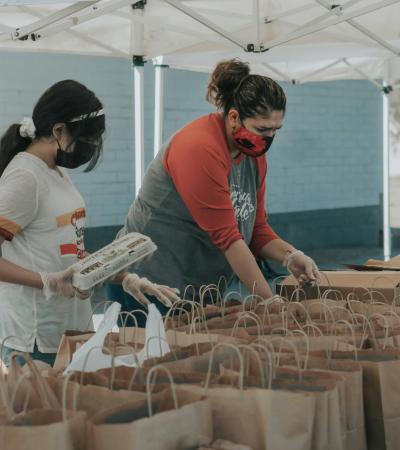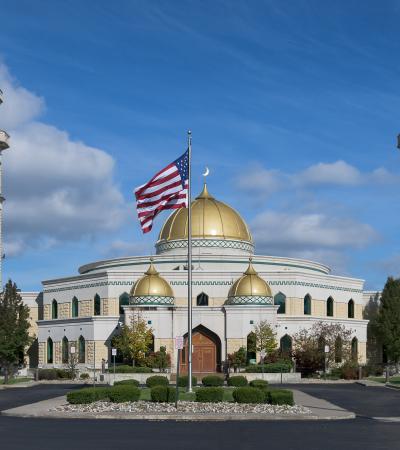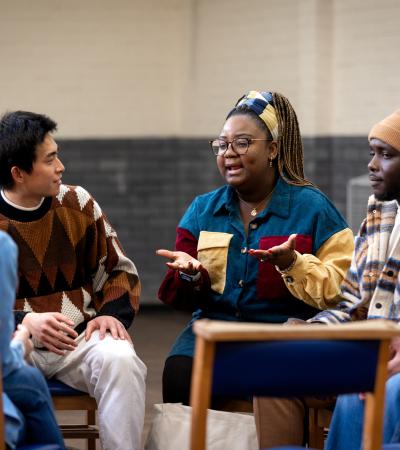The Human Library has become a popular way to challenge stereotypes and prejudice, allowing "readers" to check out a human book for topical conversation. In October 2016, the Albert S. Cook Library at Towson University hosted their own Human Library Event. Research & Instruction Librarian Laksamee Putnam shares her experiences in researching, developing and hosting this vibrant event.
What was your inspiration for bringing a Human Library program to Towson? How did you go about researching it?
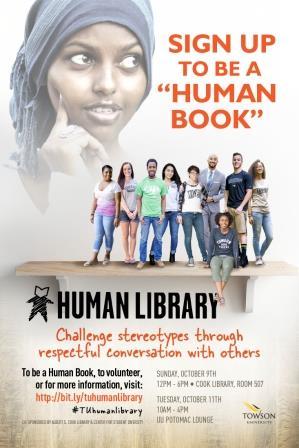
This past spring, my colleague Sarah Gilchrist and I participated in a Human Library at Johns Hopkins. The success of that event motivated me to organize one for Towson. The concept of a
Human Library is fairly straightforward, and it is especially relevant today as we see an increase in student activism across campuses. There is a need to make sure open conversations are happening for various parts of every community.
I first contacted the official Human Library Organization. They sent me general guidelines and suggestions for potential marketing and granted me permission to use their logo and materials.
Also, one of our librarians put me in touch with librarians at the University of North Texas. They shared materials they used, like an Excel spreadsheet for their Human Book catalogue and a “useful tips” sheet for volunteers.
Another colleague had recently attended Library Instruction West and pointed me toward a LibGuide on the Human Library, created by the University of Alberta, which I found helpful when creating our own LibGuide.
Let's talk timeline. How far in advance did you start planning, recruiting volunteers and advertising?
We wanted the event to be in the fall, so we started our planning in early summer. After consulting our students, we picked dates early in the semester — but after the first crush of orientation events. We also tried to keep various holidays in mind, but since we decided to hold the event on a Sunday and a Tuesday, we did not have much flexibility there. In the future, I might consider holding the event over the span of a week, to allow for more exposure and broaden our volunteer and audience base.
After choosing dates and booking locations, we contacted our university marketing office and had fliers and posters designed. I also created a LibGuide to describe our event and a Google Form for volunteers to fill out.
How did you recruit volunteers?
We started sending out a call for volunteers right when school started. The majority of them signed up in early September, but I left it open until the week before the event. The call for volunteers and the general advertising went out to campus in a variety of ways: on the library website, daily campus announcements, digital signs in various campus buildings and fliers in specific offices like the Center for Student Diversity. I also asked our liaison librarians to reach out to any particular groups they thought might find the event relevant, which was great because we recruited some journalism class interest that way!
So, how did the program go? What successes did you have, and what would you do differently next time?
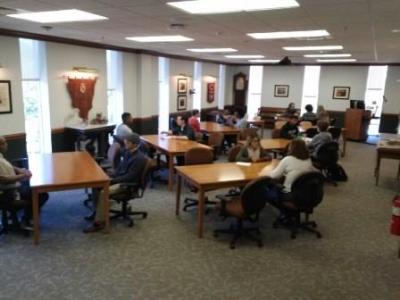
The most nerve-racking part for me was waiting to see if all my volunteers showed up and that readers came to talk to them. Luckily, they did!
- On Sunday, Oct. 9, our event inside the library had 15 Human Books. We had 19 patrons read 22 books.
- On Tuesday, Oct. 11, our event in the University Union had 11 Human Books. We had 26 patrons read 29 books.
Of the 45 readers, we received “reader review” forms from 32 of them. The readers were asked to rate their experience and all of them rated it "excellent" or "very good." They also all either "strongly agreed" or "agreed" with the statement that the Human Library is a good way to challenge discrimination.
The volunteers all expressed enthusiasm from the conversations they had, with readers and with each other. We even had many of them want to add to their titles as they gained an understanding of the intersectionality of their identity.
We did have around eight volunteers not show up, which was not a problem, but I would like to try to keep that number low. Perhaps next time, we will directly call some of the volunteers rather than just email them. We also realized it was hard to quickly explain the Human Library to people walking past and that some people did not understand even after seeing our informational posters around campus. We need to improve our pitch.
Despite our marketing efforts, students still told us we needed to publicize more. The struggle to get the word out is always a difficult challenge. One way I’m hoping to improve marketing is to connect with more classes on campus that might find the Human Library relevant to class content. It would also be great if we could partner with other campus groups, such as Student Government or Greek Life.
Laksamee said she is happy to share their materials and provide any advice from the program. More information — including her contact information — can be found on Towson University's Human Library LibGuide. You can also read more about the vent in Towson's campus newspaper.

